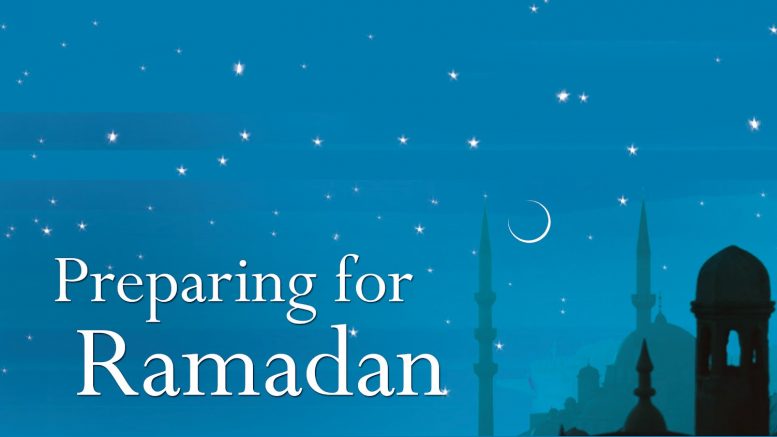My approach to this topic is based on the fact that the individual is the building block of any society, and also to the fact that Allah has laid special emphasis on the individual and his/her spiritual and moral upliftment during the month of Ramadan. If the individual is islamically sound and sincere, then the society will become Islamic. I have looked briefly at how Allah and his Rasul (ﷺ) has explained how the individual can best utilize this special month to develop a personality that is based on Qur’an and Sunnah.
As Muslims our approach to this very important month should be as though we are entering into a training programme put together by Allah and His Rasul (ﷺ) for each of us individually. Consequently we note that Ramadan is preceded by Rajab and Shaban, which are pre-training periods, since extra (nafl)-voluntary fast and zikr (remembrance of Allah) are recommended. Therefore as Ramadan enters, a Muslim becomes prepared to undergo some level of spiritual, physical and moral training for what Qur’an describes as: “La Allakum tattaqoon” – so that you may become pious and virtuous. (2:183)
Tazkhiyyah or spiritual training of the Individual during Ramadan
The most important duty of a Muslim is to inculcate fear of Allah, implant His love in his/her heart and to promote attachment to Him (TAALUQ BILLAH)! This means that a Muslim should live and die only for Allah, and his worship and sacrifices should be only for Allah,
“(Say O Muhammad (ﷺ), surely my prayer and my sacrifice and my life, and my death are all for Allah the cherisher of the Worlds”. Qur’an 6:163)
To strengthen your relationship with Allah during Ramadan, the following spiritual exercises are important:
1) Salaah – (prayers) – Fard/Nawafil [Compulsory/Voluntary]: Apart from the required obligatory (fard) Prayer, other sunnah and nawafil (voluntary) prayers should be offered. as is reported in a hadith (saying of the Prophet ﷺ):
(a) Abu Hurairah reported that Allah’s Messenger (ﷺ) used to exhort (his companions) to observe prayer (at night) during Ramadan, without commanding them (to deem it to be obligatory and said ‘He who observed (tarawih prayer) during the night of Ramadan, because of faith and seeking reward (from Allah) all his previous sins will be forgiven.’ (Mishkat)
(b) Jabir reported Allah’s Messenger(ﷺ) as saying “When anyone of you observes the prayers in the mosque, he should earmark some share of his prayers for the house, for Allah would bless his house because of his prayers.” (Muslim)
Apart from tarawih, other nawafil [voluntary] prayers are recommended, especially tahajjud (late night prayer). Maulana Maududi has stated “But make it a point that you offer the nafl [voluntary] prayers indoors and in secrecy so that your personal attachment with Allah might increase, and sincerity of purpose develop in you. Show of nafl or tahajjud prayers gives way to hypocrisy and self-importance which is detrimental to sincere belief”.
(2) Saum (fasting):- This is a continuous, rigorous, spiritual, discipline and self control, that trains one for perfect and cheerful obedience of Allah. It strengthens one’s faith in Allah and makes one sincere, faithful and obedient to His commands. It enables us to be the master and not the slave of our desires and appetites – thus we develop confidence. Fasting also develops a strong sense of nearness and closeness to Allah and of His presence everywhere. The Prophet (ﷺ) has said:. “There are two pleasures for the fasting person, one at the time of breaking the fast and the other at the time when he meets his Lord, then he will be pleased because of his fasting”.
(3) Lailat-ul-Qadr and Itikaf [The night of Power and spiritual retreat to mosque]: Ayesha related that “When the last ten days of Ramadan began, the Prophet (ﷺ) use to prepare himself for prayer. He stayed awake throughout the night, and also wakened the members of his family.”
Ayesha also relates how the Prophet (ﷺ) spent these last ten days of Ramadan: ” -… the Prophet (ﷺ) observed ‘Itikaf and went into seclusion during the last ten days of Ramadan and he advised the people to look for the night of power in the odd nights of the last seven days of (Ramadan)”. (Muslim).
(4) Zikr-i-llah [remembrance of Allah]: Mujaddid Alf Thani explains:
“If a person is fortunate enough to perform a good deed in the month of Ramadan, the blessedness of it will not depart from him for the whole year and if this month is spent in distress and frustration the danger is that the whole year will pass for him in the same way.” The most appropriate way to remember Allah, taught to us by the Holy Prophet (ﷺ) is to try and learn by heart, as many duas as possible, fully grasping their meanings and reciting them often keeping the meanings present in your mind. It is reported in Tirmidhi, that the Holy Prophet (ﷺ) has said that Allah will not refuse the duas of three persons – the righteous and just Imam, the oppressed one, and the fasting person.
(5) Infaq-fi-sabilillah:(spending in the way of Allah)
Ibn Abbas related that the Prophet(ﷺ) was the most generous of all men, but in the month of Ramadan, when Gibrael, used to come to him, his generosity knew no bounds. It is also related in Bukhari and Muslim that during the day of Ramadan, the Prophet (ﷺ) appeared to be faster than the wind in acts of charity and benevolence. Hence, acts of charity, obligatory as well as nawafil, (to the extent of one’s means), should be , continuously done. It is related in Mishkat 7:i:iii – This is a month in which the sufferings of the poor and their hunger must be attended to, Many Muslims use Ramadan for payment of zakaat [charity], which in itself is a purification, becomes ten time its worth in the sight of Allah, during this Month.
(6) Preference for Aakhirah:
Since our eternal abode is the hereafter, we must in our spiritual development give due consideration and preference to this fact and try to develop a conscious preference for Al-Aalchirah [hereafter].
By involving ourselves in the above mentioned spiritual exercises, one can develop an everlasting attachment with Allah and enjoy His companionship.: “When My servants ask you concerning Me, I am indeed close to them. I listen to the prayer of every crier who calls on Me-. Let them also with a will listen to My call, and believe, in Me, that they may walk in the right way”. (2:186)
The Muslims during Ramadan can now evaluate his consistency and commitment to Allah and his din [way of life].
Tarbiyyah- character and moral development
Abu Hurairah narrated that the Prophet (ﷺ) said “Whosoever does not abstain from uttering lies and acting according to them, Allah is not in need of his giving up his food and drink” (Bukhari). The Prophet (ﷺ) is also reported to have said: “Fasting is an amour with which one protects oneself, so let not him (who fasts) utter immodest (foul) speech, nor let him not act in an ignorant manner, and if a man quarrels with him or abuses him he should say twice ‘I am fasting’ (Bukhari). In another version he (ﷺ) said “fasting is a shield until it is ripped” “By what” asked a sahaba he (ﷺ) replied “by backbiting”.
During the month of Ramadan we must exert ourselves to pattern the character of the USWAH [best example]- Rasullulah (ﷺ) and as was explained by Ayesha (May Allah be pleased with her) His character was Qu’ran.
Some other practical ways to develop character during this rnonth includes:.
Muhammad Iqbal in one of his writings said that he considered himself to be the best Muslim among all Muslims, until he took the Qu’ran as a mirror and looked into it but he could not see his face. The Holy Prophet (ﷺ) has said “Whosoever looked to the higher than himself in case of his din and followed his footsteps; and looked to the lower than himself in gains and thanked Allah for what He has given him, got himself recorded with Allah as contented and grateful. On the contrary, one who looked at the lower for his din, and at the higher for his worldly gains and felt grief and regrets for lacking in worldly gains, would be recorded neither contented nor grateful.”
(3) During the month of Ramadan, we should as part of character development, exhibit special concern for our families, friends and Jamaat. [neighbourhood congregation] Allah says in Qu’ran: “Save yourselves and your kith and kins from the fire” (chap 66 verse 6). So apart from providing the necessities such as security, food, shelter, clothing etc…. we must strive to see our near and dear ones on the path of siraatal mustaqeem [straight way], to attain peace and also salvation. Also, apart from the seven duties of one Muslim to another; we must take interest in each other and help each other personallv in whatever way possible. In other words, together with striving for betterment and reformation of yourself – you must also strive for betterment and reformation of your families and fellow Muslims of the Jamaat. This is a form of collective purification. As the Rasul (ﷺ) has said: A Muslim is like a mirror to another Muslim.
(4) Muhasabah – Individual and Collective:
Allah says in Qur’an 2:183 “La allakum tattaqun …. fasting is made obligatory on you ……maybe you will become pious and virtuous.” In other words after Ramadan, there should be changes in our attitude and behaviour patterns such that our character must reflect spiritual and moral growth. Hence, in individual self evaluation (Muhasabah), the objectives set by Allah and Ilis Rasul (uwpb,) for Ramadan, must be evaluated by us during and after Ramadan; to see how well we have utilized and how much we may have achieved personally. During this month, mutual criticism, in the correct islamic manner, should be done among the fraternity of a Jamaat; so that one helps the other to develop gradually islamic personalities.
Ilm and Ramadan:
There is a meaningful relationship between the Holy Qur’an and fasting. It is reported in Sahih Bukhari and Sahih Muslim, that in Ramadan Garbriel came to the Prophet (ﷺ) every night and joined in the recitation of the Qur’an. We are also told that the Prophet (ﷺ) used to pay the greatest attention to the recitation of Qur’an in Ramadan. Therefore, during Ramadan we should try to develop an attachment to the Qur’an, by way of Tilawatil-Qur’an [recitation,] and also by memorizing various Ayaats [chapters] and Surahs [verses].
Our personal study programmes should be focused towards more tafsir-ul Qur’an [explanation of the meanings] and hadith of Rasullualh (ﷺ), to gain closer understanding and at the same time develop an attachment to these important texts. Knowledge and education of Islam should flow as much as possible during the month of Ramadan firstly, to you the individual and secondly from you the individual; hence activities that will encourage this principle should be maximized: eg; study circles, maqtabs, short talks, lectures, da’wah programme and so on.
Brotherhood and Society:
Gathering in the masjids for Iftar and tarawih demonstrates brotherhood in action, and gives an air of festivity, which develops closeness and friendship. Hence we aught to grasp the opportunity within our Jamaats to attend and contribute towards brotherhood upliftment and Jamaat activities in general. Also by Muslims keeping fast and doing good and righteous acts within a society/Jamaat during Ramadan; the whole atmosphere becomes permeated with religious piety and devotion to Allah. This Islamic spill – off to society imposes a certain level of religious checked on firstly, the non-practising Muslims and secondly to a certain degree on the non-Muslims.This secondary effect of Ramadan could be harnessed by collective efforts of Jamaat members to instigate several levels of da’wah [inviting to good] programmes:
(1) Familiarization with members of Jamaat – Da’wah oriented.
(2) seeking out the non-practicing members of the Jamaat and giving them the message with the objective of getting them involved in some study sessions.
(3) Programmes of study for women and children.
(4) Da’wah to non-Muslims in Jamaat area identifying “potential Muslims” thus providing contacts for further sustained da’wah work.
In conclusion, we note that every act in Ramadan is rewarded immensely by Allah; and the list for maximizing Ramadan could become quite large. However, based on the Shariah conceptualization of activities in Ramadan, I have tried to view the individual Muslim as consolidating through introspection, while pleasing Allah by fulfilling his role as a dynamic islamic worker. Abu Hurairah (may Allah be pleased with him) reports the Rasul (ﷺ) as saying: “He who fasts during the month of Ramadan out of faith and seeking its rewards, deserves to be forgiven his sins committed previously. And he who stands to pray in Ramadan with belief and seeking its rewards deserves to be forgiven (minor) sins committed previously. And whoso stands up (in prayer) during the night of Decree out or faith and hopeful of rewards, all his past sins will be pardoned”
Resources:
(1) The Holy Qu’ran
(2) The meaning of Qu’ran – Maududi (tafsir)
(3) Sahih Muslim
(4) Sahih Al-Bukahri
(5) Mishkat-A1 Masabih
(6) Al Muwatta – Imam Malik
(7) The foundations of Qu’ran and Hadith
(8) Selections from Qur’an and Hadith -Abdul Hameed Siddiqqui
(9) Four pillars of Islam – Abul Hassan Nadwi
(10) Islam – ideology and way of life – Afzlur Rahman.
(11) Guidelines for workers – Maududi
(12) The Religion of Islam – M. Ali





Be the first to comment on "TOWARDS MAXIMUM UTILIZATION OF RAMADAN"